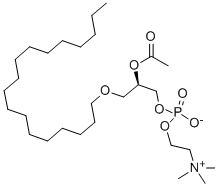PAF C-18 is a naturally occurring phospholipid produced upon stimulation through two distinct pathways known as the “remodeling” and 'de novo' pathways. It is less potent than PAF C-16 in the induction of platelet aggregation, but equipotent in activation of guinea pig macrophages. PAF C-18 induces the release of PGE2 and TXB2 from albumin-elicited guinea pig macrophages, and enhances the spreading of plated macrophages. Pathological processes involving PAF include necrotizing enterocolitis, inflammation, asthma, and allergy.

